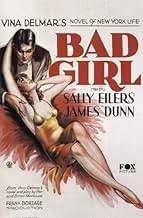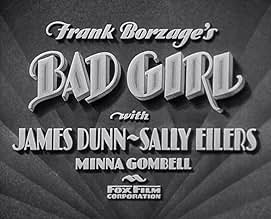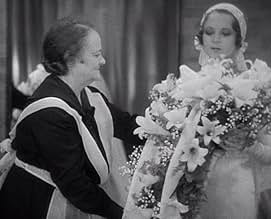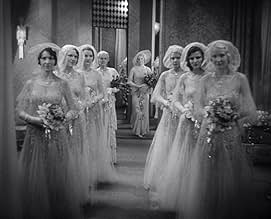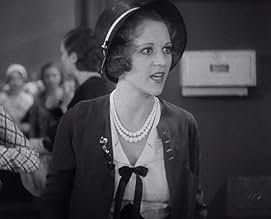AVALIAÇÃO DA IMDb
6,4/10
1,8 mil
SUA AVALIAÇÃO
Um homem e uma mulher, céticos em relação ao romance, apaixonam-se e se casam, mas sua falta de confiança no sexo oposto assombra o casamento.Um homem e uma mulher, céticos em relação ao romance, apaixonam-se e se casam, mas sua falta de confiança no sexo oposto assombra o casamento.Um homem e uma mulher, céticos em relação ao romance, apaixonam-se e se casam, mas sua falta de confiança no sexo oposto assombra o casamento.
- Direção
- Roteiristas
- Artistas
- Ganhou 2 Oscars
- 6 vitórias e 1 indicação no total
Frank Austin
- Upstairs Tenement Neighbor
- (não creditado)
Irving Bacon
- Expectant Father
- (não creditado)
William Bailey
- Expectant Father of Twins
- (não creditado)
Sue Borzage
- Unknown
- (não creditado)
Jesse De Vorska
- Expectant Father
- (não creditado)
Bud Eilers
- Man Outside Candy Shop
- (não creditado)
Edward Hearn
- Male Nurse
- (não creditado)
Aggie Herring
- Seamstress
- (não creditado)
Claude King
- Dr. Burgess
- (não creditado)
Louis Natheaux
- Mr. Thompson
- (não creditado)
Sarah Padden
- Mrs. Gardner
- (não creditado)
Lorin Raker
- Male Nurse
- (não creditado)
Avaliações em destaque
Note: some scenes described in detail.
As usual for Borzage, this is full of sentiment, and the details of the plot are deadly. Never was the development of misunderstandings between two inarticulate people more aggressively, one might say more ruthlessly, pursued. When they're not playing "Gift of the Magi" (he giving up the dream of his own radio store for the big apartment he thinks she wants), they're busy each thinking that the other doesn't really want the baby. And how could Borzage resist milking the maternity ward scene, with its inevitable ethnic cross-section, older woman, and troubled mother. And here's another version of that typical pre-Code era film pair, the beautiful girl and the unhandsome blow-hard boob.
All that said, this is still a very good film in spite of itself, certainly deserving of its Academy Award nomination for Best Picture. Borzage constantly redeems himself at the worst moments. A prime example: the evening before the baby's due Jimmy goes out to fight four rounds of preliminaries at $10 a round to pay the doctor. Sally is lying at home, convinced that he's with his drunken friends, or worse, and no longer loves her. Dunn's opponent is a mean-looking, cynical, paunchy guy who's about to knock him out in the second round. Oh, the ironic cross-cutting: he's getting the crap beat out of him, while she lies in bed, anxious and bitter. But, in a clinch, Jimmy begs the pug not to knock him out because his wife's going to have a baby. Why didn't you say so, says the obliging pug, I've got two of my own. In an amusing moment they chat away while pretending to lambaste each other. This takes the curse off the sentimental plot maneuvering.
And there are a lot of other fine sequences, too. The film starts with Eilers in a fancy wedding gown, being attended to by a dresser. She's so nervous, she tells best-friend Gombell, who's dressed as a bridesmaid. As they do the formal bride's walk through the phalanx of bridesmaids, in the corner of the screen one sees part of a tray of dirty dishes being carried by a waiter. Gradually the camera pulls back to show that they're modeling the gowns for a bunch of lecherous buyers. Then they go to Luna Park (nice shots of the park). Throughout these early scenes there are plenty of sharp pre-Code wisecracks about how men only have one thing on their minds. Funny, breezy stuff. They meet Dunn on the ferry on the way home, the first guy that doesn't make a pass. The scene shifts to the couple sitting at the foot of her rooming-house stairwell. As they talk, an old hen-pecked lush comes down the stairs, and an older woman uses the hall phone to tell her sister that their mother has just died. That may be pouring the milieu on a bit thick, Borzage style, but this scene is beautifully played by Eilers and by the older woman and is quite affecting. Later, when Eilers stays in Dunn's room (no hanky-panky, it seems) and he asks her to marry him, her brother kicks her out of the house, and Gombell, the brother's gal, walks too. (Single-mom Gombell's little boy is a terror. In the morning he won't scram: "I want to see Dotty get out of bed.") Sally is sure that Jimmy will desert her at the alter, and that's the beginning of all the tear-jerking plot elements.
But the film goes beyond those elements with a richness of detail, a generous painting of daily life in the city during the Depression. And, when all's said and done, what really makes the film, and where Borzage ultimately redeems himself, is in the performances. Eilers, who somehow never got the recognition she deserved, is beautiful and gives a strong, sensitive, emotional performance--for my money a more appealing one than most of Janet Gaynor's work for Borzage. Gombell, another undervalued thirties player, is really fine as the tough but good-natured pal, who doesn't let Dunn's dislike of her color her opinion of him as a good husband for Eilers. Her performance goes beyond the requirements of the script in very subtle ways. And Dunn, well, he plays the typical early-thirties boob of a husband, but even he has a bravura scene when he breaks down while having to beg the expensive doctor to handle his wife's childbirth. Borzage films are always full of sentiment, but not always honest sentiment. This scene with the doctor is full of sentiment, but it's honestly handled, and one can say the same for the whole film.
As usual for Borzage, this is full of sentiment, and the details of the plot are deadly. Never was the development of misunderstandings between two inarticulate people more aggressively, one might say more ruthlessly, pursued. When they're not playing "Gift of the Magi" (he giving up the dream of his own radio store for the big apartment he thinks she wants), they're busy each thinking that the other doesn't really want the baby. And how could Borzage resist milking the maternity ward scene, with its inevitable ethnic cross-section, older woman, and troubled mother. And here's another version of that typical pre-Code era film pair, the beautiful girl and the unhandsome blow-hard boob.
All that said, this is still a very good film in spite of itself, certainly deserving of its Academy Award nomination for Best Picture. Borzage constantly redeems himself at the worst moments. A prime example: the evening before the baby's due Jimmy goes out to fight four rounds of preliminaries at $10 a round to pay the doctor. Sally is lying at home, convinced that he's with his drunken friends, or worse, and no longer loves her. Dunn's opponent is a mean-looking, cynical, paunchy guy who's about to knock him out in the second round. Oh, the ironic cross-cutting: he's getting the crap beat out of him, while she lies in bed, anxious and bitter. But, in a clinch, Jimmy begs the pug not to knock him out because his wife's going to have a baby. Why didn't you say so, says the obliging pug, I've got two of my own. In an amusing moment they chat away while pretending to lambaste each other. This takes the curse off the sentimental plot maneuvering.
And there are a lot of other fine sequences, too. The film starts with Eilers in a fancy wedding gown, being attended to by a dresser. She's so nervous, she tells best-friend Gombell, who's dressed as a bridesmaid. As they do the formal bride's walk through the phalanx of bridesmaids, in the corner of the screen one sees part of a tray of dirty dishes being carried by a waiter. Gradually the camera pulls back to show that they're modeling the gowns for a bunch of lecherous buyers. Then they go to Luna Park (nice shots of the park). Throughout these early scenes there are plenty of sharp pre-Code wisecracks about how men only have one thing on their minds. Funny, breezy stuff. They meet Dunn on the ferry on the way home, the first guy that doesn't make a pass. The scene shifts to the couple sitting at the foot of her rooming-house stairwell. As they talk, an old hen-pecked lush comes down the stairs, and an older woman uses the hall phone to tell her sister that their mother has just died. That may be pouring the milieu on a bit thick, Borzage style, but this scene is beautifully played by Eilers and by the older woman and is quite affecting. Later, when Eilers stays in Dunn's room (no hanky-panky, it seems) and he asks her to marry him, her brother kicks her out of the house, and Gombell, the brother's gal, walks too. (Single-mom Gombell's little boy is a terror. In the morning he won't scram: "I want to see Dotty get out of bed.") Sally is sure that Jimmy will desert her at the alter, and that's the beginning of all the tear-jerking plot elements.
But the film goes beyond those elements with a richness of detail, a generous painting of daily life in the city during the Depression. And, when all's said and done, what really makes the film, and where Borzage ultimately redeems himself, is in the performances. Eilers, who somehow never got the recognition she deserved, is beautiful and gives a strong, sensitive, emotional performance--for my money a more appealing one than most of Janet Gaynor's work for Borzage. Gombell, another undervalued thirties player, is really fine as the tough but good-natured pal, who doesn't let Dunn's dislike of her color her opinion of him as a good husband for Eilers. Her performance goes beyond the requirements of the script in very subtle ways. And Dunn, well, he plays the typical early-thirties boob of a husband, but even he has a bravura scene when he breaks down while having to beg the expensive doctor to handle his wife's childbirth. Borzage films are always full of sentiment, but not always honest sentiment. This scene with the doctor is full of sentiment, but it's honestly handled, and one can say the same for the whole film.
Bad Girl is included in the new Murnau/Borzage and Fox collection,and kudos to them for making it available! Though an excellent little slice of life film from the Depression Era, I definitely wouldn't say that it compares with Borzage's timeless silent romances, though Borzage's recurrent theme of love conquering all is here to.The lead actors,Sally Eilers, and James Dunn, both do fine jobs, especially Dunn, who paints a very realistic portrait of a "regular Joe", decent kind of a guy. His performance rings true, and he later made a comeback, winning the Oscar for Best Supporting Actor in A Tree Grows in Brooklyn.(1945) This is the story of a young couple's struggle to make it through marriage, finances, and becoming parents. The background story of what was considered "making it" in a poor economy is especially pertinent today. Dunn's character, Eddie Collins, thought it was opening his own radio shop, providing his wife with an elaborately furnished apartment, and getting her the best doctor for her delivery. Not so different from what young couples are facing today! The film is sometimes a bit too wordy, but the slang of the time is a hoot! As one of Borzage's smaller films, it's worth a watch.
This is a beautifully made, poignant drama about a young working-class couple starting their life together in the tenements of 1930s New York. This couple is incredibly normal and that's what makes this film so watchable. They're not gangsters, prostitutes, criminals, lawyers, or society girls down on their luck, they are just an ordinary couple without anything making them different to anyone else. What makes this so enthralling is therefore its story and specifically the storytelling.
The world these people live in is perfectly encapsulated with a scene early on when a neighbour dies on one floor of their tenement and a baby is born on another. Our hero sadly concludes: "Born on the second story... he'll probably die on the fifth. All his life, just to climb three flights of stairs." This however is a positive story, it shows that although The Depression was of course a struggle, even living in a one-room-apartment people survived, they went to work, had fun, got married, started families and found happiness. It was just life and that's what this picture is about even though in this case the couple aren't sure they're ideal for each other, aren't sure what they want, aren't sure that the other one doesn't love them and that makes us uneasy as to whether they will stay together. It's so well presented that very quickly we feel we know these people so are hoping desperately that they will make a go of it and that everything works out for them.
Inasmuch that it's about ordinary people, this is somewhat reminiscent of 1932's VIRTUE but the characters and the story and even the acting in this feel more natural and modern. It is perhaps more like the Kitchen Sink Dramas of the 50s and 60s such as LOOK BACK IN ANGER but set in America.
Why is it called "Bad Girl" and why has it got such a salacious poster? Obviously to get people to flock to the cinema and obviously to get people like me nearly a century later to watch it! Fox Films however knew that to avoid riots in their theatres when the customers realised the extend of the false advertising, they had to provide a genuinely top rate entertainment and that's exactly what they did. There is no "bad girl" in this film, that was the name of the book on which this was based but even in the book "bad girl" is just an insult which is thrown unjustly around, a term which our protagonist doesn't want to get branded with. Although this was made in what's referred to as "the pre-code era" the PCA made very sure that with this picture, the Hays Code was very heavily enforced. The eyes of the nation were on them because Vina Delmar's book had caused such an outcry, it was banned in Boston and was cited as containing: downright and unforgivable nastiness. Any suggestions or even hints that pre-marital sex was something which actually existed was heavily censored. The long process of consultation with the PCA lasted so long that Fox Films considered abandoning this entire project but eventually Miss Delmar's novel was considered suitably sanitised. We obviously can't ever know how a film of the original story would have been but even so, the changes certainly haven't destroyed the theme or spirit of the story. Possibly the challenges they posed have made a more interesting movie since Borzage has had to compensate for the lack of explicit content, language and sex with a visual flair unique to him.
The poster by the way does not seem remotely connected in any way with this film - it's good though isn't it!
The world these people live in is perfectly encapsulated with a scene early on when a neighbour dies on one floor of their tenement and a baby is born on another. Our hero sadly concludes: "Born on the second story... he'll probably die on the fifth. All his life, just to climb three flights of stairs." This however is a positive story, it shows that although The Depression was of course a struggle, even living in a one-room-apartment people survived, they went to work, had fun, got married, started families and found happiness. It was just life and that's what this picture is about even though in this case the couple aren't sure they're ideal for each other, aren't sure what they want, aren't sure that the other one doesn't love them and that makes us uneasy as to whether they will stay together. It's so well presented that very quickly we feel we know these people so are hoping desperately that they will make a go of it and that everything works out for them.
Inasmuch that it's about ordinary people, this is somewhat reminiscent of 1932's VIRTUE but the characters and the story and even the acting in this feel more natural and modern. It is perhaps more like the Kitchen Sink Dramas of the 50s and 60s such as LOOK BACK IN ANGER but set in America.
Why is it called "Bad Girl" and why has it got such a salacious poster? Obviously to get people to flock to the cinema and obviously to get people like me nearly a century later to watch it! Fox Films however knew that to avoid riots in their theatres when the customers realised the extend of the false advertising, they had to provide a genuinely top rate entertainment and that's exactly what they did. There is no "bad girl" in this film, that was the name of the book on which this was based but even in the book "bad girl" is just an insult which is thrown unjustly around, a term which our protagonist doesn't want to get branded with. Although this was made in what's referred to as "the pre-code era" the PCA made very sure that with this picture, the Hays Code was very heavily enforced. The eyes of the nation were on them because Vina Delmar's book had caused such an outcry, it was banned in Boston and was cited as containing: downright and unforgivable nastiness. Any suggestions or even hints that pre-marital sex was something which actually existed was heavily censored. The long process of consultation with the PCA lasted so long that Fox Films considered abandoning this entire project but eventually Miss Delmar's novel was considered suitably sanitised. We obviously can't ever know how a film of the original story would have been but even so, the changes certainly haven't destroyed the theme or spirit of the story. Possibly the challenges they posed have made a more interesting movie since Borzage has had to compensate for the lack of explicit content, language and sex with a visual flair unique to him.
The poster by the way does not seem remotely connected in any way with this film - it's good though isn't it!
I finally tracked down Bad Girl. It had been on my list of wanna sees for years as it had won a major Oscar for Best Director- Frank Borzage.It was one of those tantalizing early talkies that had not actually been lost it had merely fell from sight. When I finally saw it last year at a Borzage revival, the film was a revelation.It was a pre-code delight about an ordinary couple, falling in love, struggling financially and having a baby etc.It most reminded me of the great silent film-The Crowd, which dealt with similar matters. What was especially fascinating to me was its depiction of "average" lower middle class types and how they lived and spoke in Depression America. The apartments... the slang, all of it, seemed real. It wouldn't be until the 50's neo realism hit American movies that we would see ordinary people depicted on the screen again, without condescension The movie has all the Borzage trademarks- love surviving against all odds, even an exciting if a little hokey climax.Unfortunately, the film has been slighted often in movie books,most likely, because the authors have never actually seen it. If it is ever shown again, try to see it. It's a wonderful peek at average city folks in Depression America.
Bad Girl is another of Frank Borzage's romantic dramas of the trials and tribulations of lovers usually caught in circumstances and forces beyond their
control. In this case it's the Great Depression and their own attitudes about
romance itself.
Their attitudes being that romance is just a lot of bunk. But attitude or not James Dunn who was making his feature film debut and Sally Eilers are in love in spite of themselves.
I'm not quite sure why the film is entitled Bad Girl since there really isn't nothing bad about Eilers at all. Possibly her original attitude though that is quickly corrected. These are just two people trying to get by, but they always seem to misjudge attitudes because of first impressions and say the wrong things at time.
Take for instance the new apartment that Dunn uses all his savings in to impress Eilers. He says exactly the wrong thing about the two of them living only for today. That's just at the time she was about to break the news that wasn't to be two any more, but three.
Dunn really loves her. How many husbands to earn an extra couple of dollars would go out and try to go 4 rounds with a professional prizefighter? Charles Sullivan proves to be a good guy however.
So does Claude King as the obstetrics specialist who does Dunn a solid when Dunn wants him for his wife's delivery. None but the best as Dunn beautifully carries off a scene breaking down begging for King's services.
The film adapted from a Broadway play of the previous year won an Oscar for adapted screenplay. It also won for Frank Borzage an Oscar for Best Director.
Today's audiences might get a kick out of the prices and the amounts needed for many things. Inflation has come a long way since. Still the themes are universal and I think Bad Girl holds up well today.
Their attitudes being that romance is just a lot of bunk. But attitude or not James Dunn who was making his feature film debut and Sally Eilers are in love in spite of themselves.
I'm not quite sure why the film is entitled Bad Girl since there really isn't nothing bad about Eilers at all. Possibly her original attitude though that is quickly corrected. These are just two people trying to get by, but they always seem to misjudge attitudes because of first impressions and say the wrong things at time.
Take for instance the new apartment that Dunn uses all his savings in to impress Eilers. He says exactly the wrong thing about the two of them living only for today. That's just at the time she was about to break the news that wasn't to be two any more, but three.
Dunn really loves her. How many husbands to earn an extra couple of dollars would go out and try to go 4 rounds with a professional prizefighter? Charles Sullivan proves to be a good guy however.
So does Claude King as the obstetrics specialist who does Dunn a solid when Dunn wants him for his wife's delivery. None but the best as Dunn beautifully carries off a scene breaking down begging for King's services.
The film adapted from a Broadway play of the previous year won an Oscar for adapted screenplay. It also won for Frank Borzage an Oscar for Best Director.
Today's audiences might get a kick out of the prices and the amounts needed for many things. Inflation has come a long way since. Still the themes are universal and I think Bad Girl holds up well today.
Você sabia?
- CuriosidadesWilliam Pawley played the role of Dorothy's brother in the stage version, and reprises his role here in the film.
- Erros de gravaçãoAt 2:54, shadow of boom mic is visible across Dot's face.
- Citações
Dorothy Haley: I gotta go upstairs now. You see, my mother's dead, and my brother's boss of the house. He gets sore when I stay out late. You know, he's careful for me. But as Edna says, you can't watch a girl hard enough to keep her good if she don't want to be.
- ConexõesAlternate-language version of Marido y mujer (1932)
Principais escolhas
Faça login para avaliar e ver a lista de recomendações personalizadas
- How long is Bad Girl?Fornecido pela Alexa
Detalhes
- Tempo de duração1 hora 30 minutos
- Cor
Contribua para esta página
Sugerir uma alteração ou adicionar conteúdo ausente

Principal brecha
By what name was Depois do Casamento (1931) officially released in India in English?
Responda
